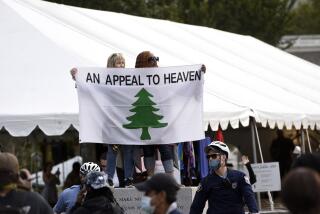Supreme Court debates legality of Mojave cross
- Share via
WASHINGTON — A Supreme Court argument Wednesday over a cross in the Mojave National Preserve sparked a sharp dispute over whether the Latin cross stands as a symbol of all fallen soldiers, including Jews and Muslims.
In a discussion over whether the display within a public preserve violated the 1st Amendment ban on “establishment of religion,” a Los Angeles lawyer for the American Civil Liberties Union said a cross “is the predominant symbol of Christianity.
“It signifies that Jesus is the son of God and died to redeem mankind for our sins,” Peter Eliasberg told the justices. But because of its special religious significance, he said, it should not stand alone as a prominent symbol in a national park.
Justice Antonin Scalia sharply disagreed. “It’s erected as a war memorial. I assume it is erected in honor of all the war dead.”
Eliasberg objected: “I have been in Jewish cemeteries. There is never a cross on a tombstone of a Jew.”
Scalia shot back: “I don’t think you can leap from that to the conclusion that the only war dead that the cross honors are the Christian war dead. I think that’s an outrageous conclusion.”
The exchange highlighted an hourlong debate over whether the Mojave cross is unconstitutional or if Congress resolved the problem by transferring the land under the cross to the Veterans of Foreign Wars.
After the arguments, the Rev. Barry W. Lynn, executive director of Americans United for Separation of Church and State, called Scalia’s comments “shocking” and “outrageous.”
“He actually said that this cross represents all veterans, even those who are not Christian,” Lynn said. “Is Scalia seriously arguing that the cross is no longer a religious symbol? Now that is an outrageous conclusion.”
At issue was a cross that sits atop Sunrise Rock in a remote part of the Mojave National Preserve. Since 1934, the cross has existed, in one form or another, as a war memorial. Different court documents refer to it as 5 to 8 feet tall.
A decade ago, it came under legal attack from a former park service employee who, though a Catholic, thought it was inappropriate to favor one religion over another in the preserve. The National Park Service had turned down a request to have a Buddhist symbol erected nearby.
A federal judge and the U.S. 9th Circuit Court of Appeals ruled that the stand-alone display of the cross in the national preserve was unconstitutional and, further, Congress’ move to transfer it to the private VFW did not solve the problem.
The Obama administration, joining with the VFW, urged the high court to uphold the display of the cross now that it is in private hands.
U.S. Solicitor General Elena Kagan said that the “sensible action by Congress” to give the VFW control of the cross and the land under it solved the 1st Amendment problem. The cross is no longer on government land and under government control, she said.
“It’s VFW’s choice” how to preserve it and maintain it now, she said.
Not all of the justices sounded convinced. Justices Ruth Bader Ginsburg and John Paul Stevens noted that the Mojave cross was designated as a national memorial and that Congress said it must be preserved as a cross to honor America’s war dead. If not, the land and the cross would revert to government control, they said.
Eliasberg argued that the transfer was an obvious ploy to maintain the cross after it had been declared unconstitutional by a federal court.
He agreed that crosses in a national cemetery would not pose a constitutional problem because other religious symbols, such as a Star of David for Jewish soldiers, are included as well.
By the end of the hour, it was not clear what issue the justices would decide. They could decide whether the transfer of the cross to the VFW solved the legal problem. Or they could go further back and decide whether it was constitutional to erect the cross on public land.
Some lawyers thought the justices could focus on whether the original plaintiff, former park service employee Frank Buono, had legal standing to object to the cross. But that issue was hardly mentioned in the court Wednesday.
It will probably be several months before the court hands down a decision in the case of Salazar vs. Buono.
--
More to Read
Sign up for Essential California
The most important California stories and recommendations in your inbox every morning.
You may occasionally receive promotional content from the Los Angeles Times.











